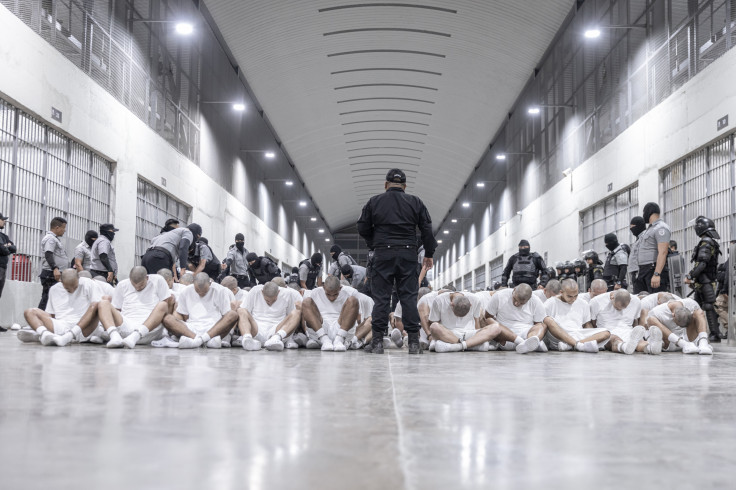
The Trump administration recently deported a Maryland father to El Salvador's mega-prison, leading to the Supreme Court to order his return back to the U.S. But despite that case, which officials acknowledged as a mistake, the administration has embraced the initiative, removing Venezuelans accused of being gang members and with President Donald Trump saying he would also like the idea of deporting American citizens to the country's infamous prison system.
The president told reporters on Air Force One on Sunday that "we have some horrible criminals, American grown, born," and that he's "all for" sending them to prisons in El Salvador— where some Venezuelan migrants are already being detained. "I don't know what the law says on that," he added.
White House press secretary Karoline Leavitt defended the comments Tuesday, telling reporters that, "to the president's idea for American citizens to potentially be deported, these would be heinous, violent criminals who have broken our nation's laws repeatedly," The Washington Post recalled.
But despite the administration's declaration, legal experts are sounding the alarm for potential grounds of abuse, arguing there is no legal pathway for this program to take shape. This is because a U.S. citizen cannot legally be deported or denied entry to the United States. Jean Reisz, an associate professor of law who co-directs the University of Southern California Gould School of Law Immigration Clinic, said Trump's suggestion "does not seem very realistic."
Last month, after attacks on Tesla dealerships and vehicles in protest of Trump's influential adviser Elon Musk, Trump said on social media that he hoped offenders would "get 20 year jail sentences" that could be served "in the prisons of El Salvador."
Gabriel J. Chin, a professor and scholar of immigration law at the University of California at Davis, said in an email to The Washington Post that such a proposal is "the equivalent of sending political opponents to the Gulag in the Soviet Union era."
El Salvador's prisons have been decried by human rights and the U.S. government itself, which described "harsh and life-threatening prison conditions" in a 2023 report, including allegations of arbitrary or unlawful killings from medical neglect or physical abuse.
Chin added that "there are serious arguments that it is illegal, in the sense of not being an authorized punishment under law, and unconstitutional under the Eighth Amendment as a cruel and unusual punishment" to send incarcerated U.S. citizens to Salvadoran prisons.
Adding further obstacles to Trump's ideas is the fact that there are only a few ways a person can be expatriated or denaturalized, stripping them away from U.S. citizen and hence some constitutional protections.
For a U.S.-born citizen, the government would have to prove that the person had committed some act with the intent of giving up their citizenship— such as serving in a foreign military, running in a foreign election or committing treason.
Intention is crucial because such actions alone cannot deprive a person of citizenship, Reisz said, adding: 'The government could maybe prove intent through circumstantial evidence, but it's very hard to do."
For naturalized citizens, there is an additional way— if the government proves they were not entitled to citizenship in the first place, such as if they obtained it through some sort of fraud. A legally naturalized citizen who is convicted of an unrelated crime later cannot be stripped of their citizenship for that crime, according to The Washington Post.
The legality of the administration's deportation efforts to send migrants to El Salvador has gathered national attention. But among the cases that has raised the most concern is that of Kilmar Abrego Garcia, a Salvadoran migrant who has lived in the U.S. for roughly 14 years, was accidentally sent to CECOT, El Salvador's infamous mega-prison. The administration admitted in legal documents that his deportation was the product of an administrative effort, yet they lacked the power to bring him back to Maryland.
The case not only has sparked legal debates, but also demonstrations across the country led by immigration advocates who have argued it may not be long before the administration starts sending citizens to prisons abroad.
Ultimately, the U.S. Supreme Court ordered the Trump administration to "facilitate" the return of Abrego Garcia back to the U.S. SCOTUS effectively turned down the administration's request to set aside a judge's order that "properly requires the Government to 'facilitate' Abrego Garcia's release from custody in El Salvador and to ensure that his case is handled as it would have been had he not been improperly sent to El Salvador."
© 2025 Latin Times. All rights reserved. Do not reproduce without permission.




